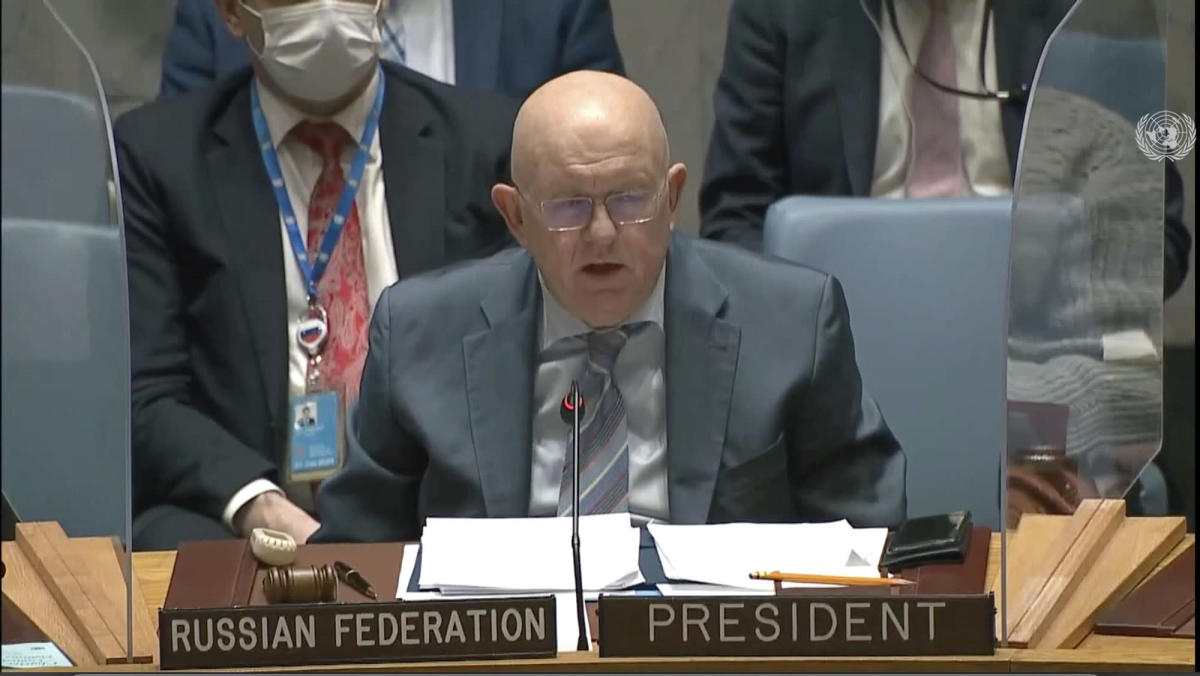
The Latest on the Russia-Ukraine crisis (all times local):
___
UNITED NATIONS — China has called for restraint and is encouraging every effort to find a diplomatic solution to the Ukraine crisis, saying Beijing believes all countries should solve disputes by peaceful means in line with the U.N. Charter.
China’s U.N. Ambassador Zhang Jun called on the key parties in the Ukraine dispute “to continue dialogue and consultation and seek reasonable solutions.”
Zhang gave very brief remarks at an emergency meeting of the U.N. Security Council on Monday night called by Ukraine, the U.S. and six other countries following Russian President Vladimir Putin’s announcement that Russia will recognize the separatist areas in eastern Ukraine as independent states and is putting Russian troops into Luhansk and Donetsk as peacekeepers.
The Chinese ambassador made no mention of actions on Monday by its usual ally, Russia, saying only that “all parties concerned must exercise restraint, and avoid any action that may fuel tensions,” and to “welcome and encourage every effort for a diplomatic solution.”
Chinese state media is reporting that China’s Embassy in Kyiv notified its citizens in Ukraine to heighten their safety awareness and avoid conflict areas. On Monday, Foreign Ministry spokesperson Wang Wenbin said China hoped all parties would pursue a solution that is “truly conducive to safeguarding the security of Europe.”
___
TOKYO — Japan’s Prime Minister Fumio Kishida criticized Russia for violating Ukrainian sovereignty and territorial integrity and said his country will discuss possible “severe actions” including sanctions with the international community.
Kishida was responding to Russian President Vladimir Putin’s signing Monday of decree recognizing the independence of two separatist regions in eastern Ukraine, ordering his troops to “maintain peace” in those areas. Putin’s announcement raised fears of an imminent invasion.
“Those actions are unacceptable, and we express our strong condemnation,” Kishida told reporters Tuesday. “Japan is watching the development with grave concern.”
Separately, Foreign Minister Yoshimasa Hayashi said Tuesday it was important that Group of Seven nations that share values such as democracy and rule of law stick together and lead the international community. He declined to say if Japan is planning its own sanctions against Russia.
___
UNITED NATIONS — The U.S. ambassador to the United Nations has dismissed “as nonsense” Russian President Vladimir Putin’s announcement that he is putting Russian troops in separatist areas of eastern Ukraine as peacekeepers, saying their presence is “clearly the basis for Russia’s attempt to create a pretext for a further invasion of Ukraine.”
Linda Thomas-Greenfield told an emergency meeting of the U.N. Security Council on Monday night that this move and Putin’s earlier announcement that Russia will recognize the separatist areas as “independent states” are also an “unprovoked” attack on Ukraine’s sovereignty and territorial integrity. By his actions, she said, Putin “has torn the Minsk Agreement to shreds.”
Thomas-Greenfield said Putin “has put before the world a choice” and it “must not look away” because “history tells us that looking the other way in the face of such hostility will be a far more costly path.”
She said Putin is testing to see “how far he can push us all,” and all countries must stand up for the sovereignty, independence and territorial integrity of all countries.
Thomas-Greenfield warned that “the consequences of Russia’s actions will be dire — across Ukraine, across Europe, and across the globe.”
___
WELLINGTON, New Zealand — New Zealand Foreign Minister Nanaia Mahuta said there was no basis under international law for recognizing the separatist regions, and that by doing so Russia was further undermining Ukraine’s sovereignty and territorial integrity.
“We are concerned that this is a calculated act by President Putin to create a pretext for invasion, which would be a clear act of aggression. We again call for urgent diplomatic efforts to find a peaceful resolution,” Mahuta said in a statement.
___
UNITED NATIONS — The U.N. political chief has opened an emergency meeting of the Security Council, calling Russia’s recognition of separatist areas in Ukraine’s east a violation of the country’s territorial integrity and sovereignty.
Undersecretary-General Rosemary DiCarlo said that “the risk of major conflict is real and needs to be prevented at all costs.”
DiCarlo told Monday’s rare nighttime meeting of the U.N.’s most powerful body — a reflection of the seriousness of Moscow’s action — that everyone involved should focus on ending hostilities immediately.
She said the United Nations regretted Russia’s order to deploy Russian troops into eastern Ukraine and expressed deep concern at reports of civilian casualties, the targeting of civilian infrastructure, and escalating shelling between government-controlled areas and the Russian-backed separatists.
Monitors from the Organization for Security and Cooperation in Europe recorded 3,231 cease-fire violations in the Donbas area of eastern Ukraine from Friday to Sunday, she said.
___
TRIABUNNA, Australia — Australia’s Prime Minister Scott Morrison said Russia should “unconditionally withdraw” from Ukrainian territory and cease to threaten its neighbors.
Russian President Vladimir Putin ordered forces Monday to “maintain peace” in separatist regions of eastern Ukraine, hours after the Kremlin recognized the area’s independence. The announcement raised fears that an invasion was imminent, if not already underway.
Morrison at a news conference Tuesday in Australia’s Tasmania state said Russia’s actions were “unacceptable, it’s unprovoked, it’s unwarranted.”
“It is important that like-minded countries who denounce this sort of behavior do stick together and I can assure you that the moment that other countries put in place strong and severe sanctions on Russia, we will be in lockstep with them and we will be moving just as quickly and that is what their discussions that we have been engaged with now for some time with our partners,” he said.
The Kremlin decree left unclear when, or whether, troops would enter Ukraine. But it brought swift promises of new sanctions and underscored the steep challenges of staving off a military conflict.




